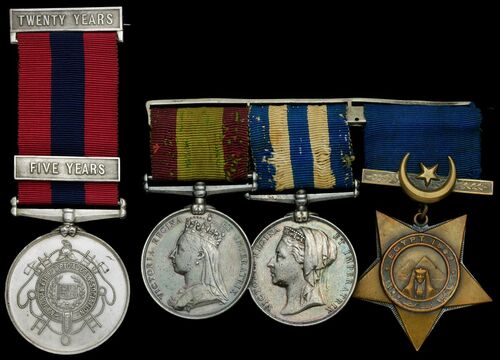
Auction: 23111 - Orders, Decorations and Medals - e-Auction
Lot: 530
Four: Private W. Smith, 63rd Foot
Afghanistan 1878-80, no clasp (998. Pte. Wm. Smith. 63rd Regt.); Egypt and Sudan 1882-89, no clasp (998. Pte. W. Smith. 1/ Manch. R.); Khedive's Star (Pte. W. Smith. 1/Manch: R. 998), engraved naming; National Fire Brigades Association twenty Year Long Service Medal, 1 clasp, five years, (3087 Charles T. Smith.), the first three mounted as worn, the last mounted separately for wear, heavy pitting and contact wear overall, nearly very fine (4)
William Smith was born at Monkland, Airdrie, Lanarkshire in 1846, the son of John Smith of New Street, Airdrie. Working as a miner prior to attesting for the 63rd Regiment of Foot on 6 July 1865 Smith saw home service for his first five years with the colours. Posted to India on 6 October 1870 with the 1st Battalion he was still there eight years later on the outbreak of the Second Anglo-Afghan war.
The 63rd Foot was not immediately engaged in the war, being stationed on the North West Frontier at the time. Here they guarded the lines of communication under Brigadier-General Phayre and saw little action until the disastrous British setback at Miawand. With the Garrison of Kandahar under siege by Ayub Khan General Roberts set out from Kabul with his army even as Phayre assembled his own relief force. The 63rd marched to Kandahar but arrived after Roberts, missing the climactic Battle of Kandahar. They nevertheless made the difficult journey through hostile territory in good order.
Remaining in Afghanistan after the campaign- presumably as part of the clearing up operations- Smith did not return to India until 10 November. He was here for less than a year before being posted to Egypt as part of the build up of British troops for the Anglo-Egyptian War. Arriving on 7 September 1882 they were not present for the Battle of Tel-El-Kabir but remained in Egypt as part of the force ensuring the Khedive's return to power. Their main role being as a garrison at the city of Ismailia which offered strategically important access to the Suez Canal.
Returning to Britain after sixteen years in the East Smith was to see almost four years of home service before finally being discharged on 26 July 1886. Obtaining work at the Ordnance Store Depot in Purfleet, Essex he worked there for some time, apparently also serving as a member of the Fire Brigade - often still voluntary bodies; sold together with copied research including census records and service papers.
Subject to 20% VAT on Buyer’s Premium. For more information please view Terms and Conditions for Buyers.
Sold for
£260
Starting price
£140




